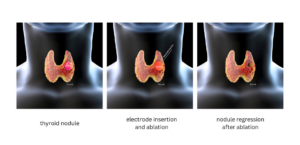Radiofrequency Ablation: An Alternative Approach to Treating Papillary Thyroid Cancer
Papillary thyroid cancer (PTC) is the most common type of thyroid cancer, and while surgery remains the primary treatment option, alternative approaches are being explored for certain cases. One such approach is radiofrequency ablation (RFA), which is a minimally invasive procedure. RFA uses heat generated by radio waves to destroy abnormal or cancerous tissue. In this blog post, we will talk about how RFA can be used in the treatment of papillary thyroid cancer, its benefits, and when it might be an option to consider.
During an RFA procedure, a thin needle electrode is inserted into the tumor with the help of ultrasound imaging. The electrode is carefully placed to target the cancerous cells. Once in position, the electrode emits high-frequency radio waves that produce heat. This heat destroys the cancerous cells, effectively treating the tumor. RFA is usually done by a surgeon or a specialized doctor called an interventional radiologist who has experience with RFA.
When RFA Is Considered
- Small Papillary Thyroid Cancers: For patients with small PTCs measuring 1 to 2 centimeters or smaller, RFA may be considered as an alternative to surgery. This approach may be chosen when surgery poses a higher risk of complications or when the patient prefers a minimally invasive option.
- Recurrent or Persistent Disease: RFA is a treatment option for cases of recurrent or persistent PTC. After a previous surgery, small nodules or metastatic lymph nodes in the neck region can be targeted and destroyed with RFA, providing a non-surgical alternative.
- Unfavorable Surgical Candidates: Some people with PTC may have other health problems that make them unable to have surgery. For these individuals, radiofrequency ablation (RFA) can be a good alternative treatment option. RFA can help control the cancer locally, meaning it treats the cancer cells in the thyroid without needing surgery. This approach is less invasive, which means it causes less damage to the body. If surgery is not possible due to other health conditions, RFA can still be a viable choice for managing PTC.
Advantages of Radiofrequency Ablation
The use of RFA in treating papillary thyroid cancer offers some advantages. First, it is a minimally invasive procedure, which means it requires only small incisions and causes less damage to surrounding healthy tissue. This leads to a faster recovery time and less pain compared to traditional surgery. RFA is typically performed on an outpatient basis, meaning you can go home the same day as the procedure. Another benefit of RFA is that it can be repeated if necessary, allowing for additional treatment sessions if needed.
Considerations and Future Directions
While radiofrequency ablation (RFA) shows promise as an alternative treatment for certain cases of papillary thyroid cancer (PTC), it’s important to note that its long-term outcomes and effectiveness compared to surgery are still being studied. To ensure the best treatment approach for each patient, a team of endocrinologists, surgeons, and radiologists will carefully evaluate each case.
Ongoing research and clinical trials are actively exploring how to use RFA most effectively in managing PTC. These studies aim to refine the criteria for selecting patients who would benefit from RFA, determine the appropriate treatment plans, and assess the long-term results of this procedure. The goal is to establish the safety and effectiveness of RFA as a valid treatment option for papillary thyroid cancer. This ongoing research will expand the choices available to patients, allowing for more personalized and tailored care.
If RFA is being considered as a treatment for PTC, patient selection is key. The ideal patient is one who has a small PTC with a low risk of recurrence. Molecular tests such as Thyroid GuidePx® are effective at identifying PTCs with favourable biology and a low risk of recurrence.
Final Thoughts
Radiofrequency ablation offers a minimally invasive alternative to surgery for certain cases of papillary thyroid cancer. As a localized treatment modality, RFA shows promise in managing small PTCs, recurrent or persistent disease, and cases where surgical intervention is not feasible. RFA is a promising option for managing papillary thyroid cancer, but more research is needed to confirm its long-term effectiveness. It has the potential to improve how we treat this type of cancer and help patients achieve better outcomes.
For patients wanting to connect with doctors who perform RFA, patient advocacy groups such as Save Your Thyroid (SYT) can help. SYT is devoted to educating patients on non-surgical treatment options for thyroid cysts, nodules, and cancers. For more more information on SYT, click here.



